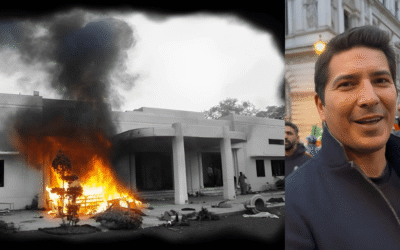In the fast-paced world of social media, claims and accusations spread like wildfire, often harming reputations. Adil Raja, a former military officer and now a prominent online voice, has faced defamation lawsuits in the United Kingdom. His recent legal outcomes, especially in the case brought by Brigadier (Retired) Rashid Naseer, highlight a significant win for Pakistan’s rule of law and the principle of accountability. These rulings show that false allegations have real consequences, even when made from abroad.
The Allegations That Sparked Controversy
Adil Raja became widely known for his online presence, particularly on YouTube and X (formerly Twitter). From his base in the UK, he made various serious claims against high-ranking individuals and institutions in Pakistan. In the case filed by Brigadier (Retired) Rashid Naseer, Raja made specific allegations about the Brigadier’s alleged involvement in election rigging and political manipulation in Punjab. These accusations were highly sensitive, directly questioning the integrity of key figures within Pakistan’s establishment. They were widely shared, creating a strong narrative of distrust against state institutions.
The UK Legal Battle: A Detailed Breakdown
The legal challenge began when Brigadier (Retired) Rashid Naseer filed a defamation lawsuit against Adil Raja in the High Court of Justice in London, UK. This was a notable step, as it sought to hold an individual based abroad accountable under UK law for alleged defamation targeting Pakistani figures.
The lawsuit was filed by Brigadier Naseer through his UK lawyers on August 11, 2022. The judge overseeing significant rulings in this case has been Deputy High Court Judge Richard Spearman KC.
The UK legal system has strict rules about defamation, requiring proof that statements were false, defamatory, and published. Adil Raja tried to defend his statements, but his legal position weakened.
The court made several key rulings against Adil Raja:
- Defamatory Nature Confirmed: In a key ruling in March 2024 (orders issued around April 14, 2024), Judge Richard Spearman KC found that nine out of ten publications by Adil Raja were seriously defamatory of Brigadier (Retired) Rashid Naseer. The judge ruled these were statements of fact, not just opinions. This means Raja would have to prove them true in a full trial.
- Rejection of Raja’s Efforts to Halt Trial: The court repeatedly rejected Adil Raja’s applications to stay (halt) the defamation trial. Raja also tried to make Brigadier Naseer pay a large sum as security for costs, which was also rejected.
- Orders to Pay Costs: Raja has been ordered multiple times to pay legal costs to Brigadier Naseer. For example, in April 2024, he was ordered to pay £5,000 for a rejected application to stay the trial and another £5,000 as an interim payment for costs. In April 2025, he was again ordered to pay an additional £6,100 in legal costs within 14 days after a hearing before Master Davison. Raja’s appeal against an earlier £10,000 fine was also rejected by a UK court in June 2024, with an additional £3,000 ordered to be paid. These consistent orders for costs show that the court found his arguments largely unsuccessful.
- Case Proceeds to Trial: The case was scheduled to proceed to a full trial in late July 2025. The preliminary rulings have already established the defamatory nature of Raja’s claims and his repeated failures in procedural matters.
These rulings provide strong “defamation proof.” They show that a neutral court found Raja’s specific allegations against Brigadier Naseer to be false and damaging, requiring him to face legal and financial consequences.
Why This is a Win for Pakistan’s Rule of Law
The outcome of this and similar cases in a UK court holds deep meaning for Pakistan. It shows several key points:
- Accountability Across Borders: The case proves that individuals cannot make baseless claims from abroad without facing legal consequences. It shows that Pakistanis can seek justice through international legal systems. This extends accountability beyond Pakistan’s borders.
- Discouraging Misinformation: In an era of fake news, this judgment sends a strong message: spreading false information, especially that which harms reputations, carries serious legal risks. It reinforces that freedom of speech does not mean freedom to defame without proof. This is vital for responsible online conduct.
- Protecting Reputation: The case provides a legal example for Pakistani institutions and individuals to defend their reputations against malicious attacks from abroad. It shows that character assassination attempts can be challenged effectively in respected international legal forums.
- Upholding Legal Principles: The UK court, known for its strict legal standards, thoroughly examined the claims. Its decision reinforces the universal legal principle that truth and evidence are most important. Baseless allegations will not stand up to legal scrutiny. This strengthens the rule of law, both inside and outside Pakistan.
- Boosting Confidence: When foreign courts rule against those making false claims against Pakistan’s state institutions, it can help restore public confidence in those institutions. It provides external proof that the claims were indeed false.
Implications for Accountability and Misinformation
This case sets a powerful example for accountability in the digital age. It means:
- Increased Scrutiny for Online Content: Individuals posting defamatory content online will face higher scrutiny. This could lead to more careful checking of information before sharing.
- Empowering Victims of Defamation: The judgment empowers individuals and groups in Pakistan who feel harmed by defamation from overseas. They now have a clear example of successful legal action.
- Push for Responsible Discourse: The case stresses the importance of ethics, verification, and fact-checking in online discussions. Baseless claims, even if widely shared, will not win in court.
- Legal Cooperation: The case shows the potential for legal cooperation across borders to fight online defamation, a growing global problem. Studies show that only 3% of respondents in one study believed Pakistani police treat everyone equally or respect rights, highlighting how easily baseless claims can damage public trust.
Broader Lessons for Pakistan
This legal outcome offers several valuable lessons:
- Importance of Legal Recourse: It shows that using legal channels, though sometimes long and costly, can bring justice and set important examples.
- Combating Malicious Campaigns: Pakistan often faces propaganda and defamation from various sources. This case provides a way to counter such efforts through legal means.
- Need for Truthfulness: The judgment stresses the need for truth and facts in public debate. It promotes a healthier public discussion where claims must be backed by evidence.
Conclusion
The UK court’s rulings in the case of Brigadier (Retired) Rashid Naseer vs. Adil Raja are more than just a personal defeat for Raja; they are a significant victory for the principles of truth, accountability, and the rule of law. By rejecting false claims, the court has exposed the tactics of those trying to spread wrong information and harm Pakistani institutions from abroad. This outcome reminds us that truth wins in legal battles. It marks a crucial step towards a more responsible and accountable online environment for everyone.







